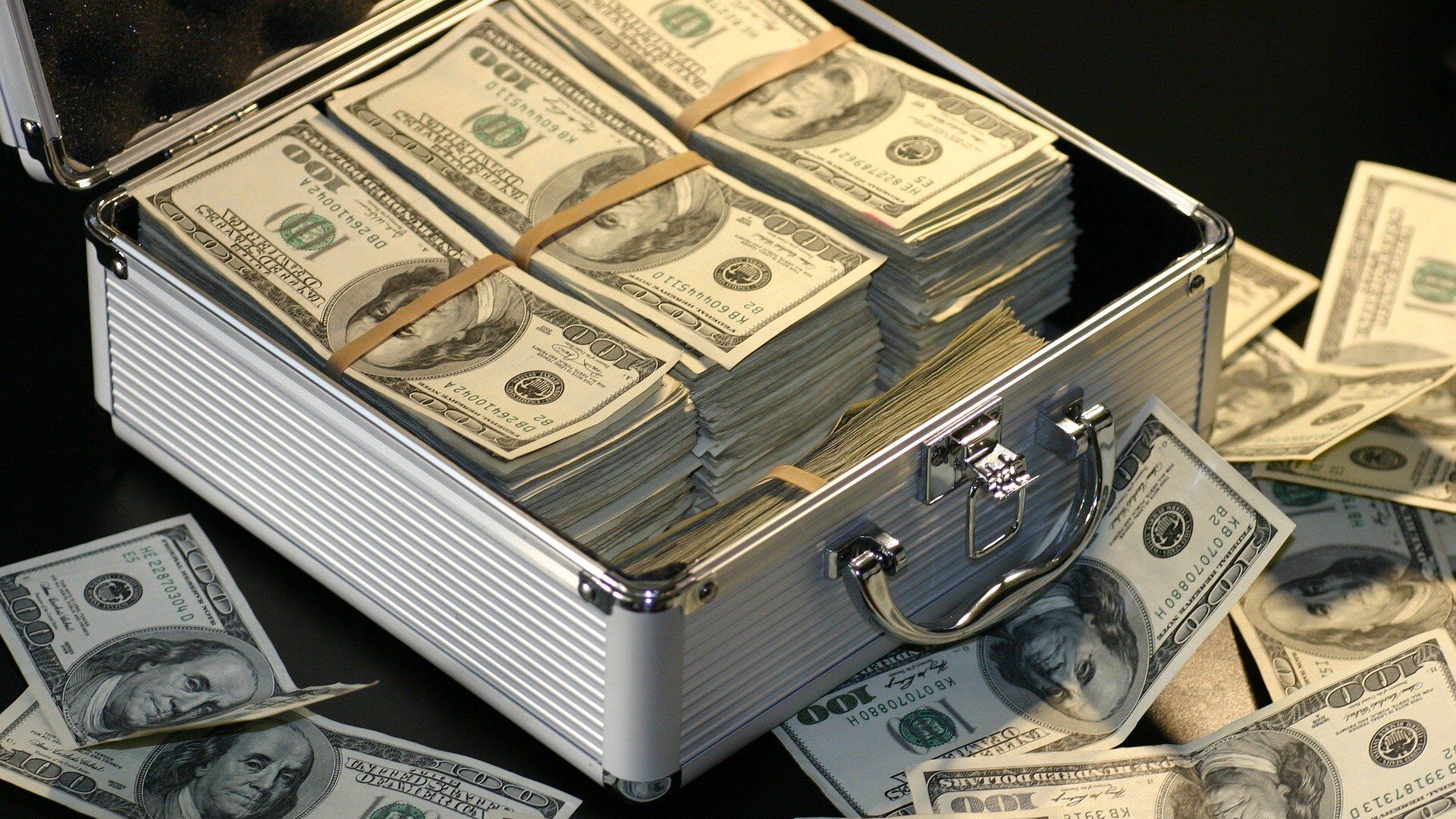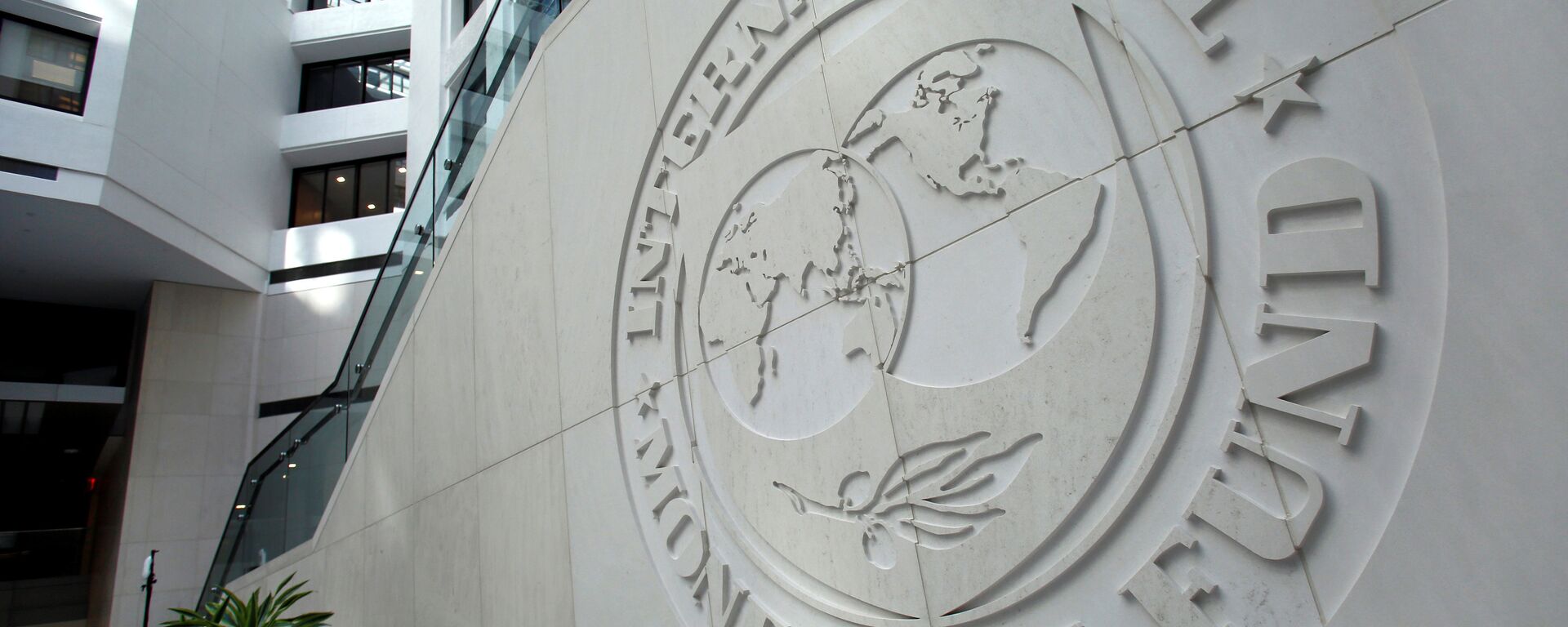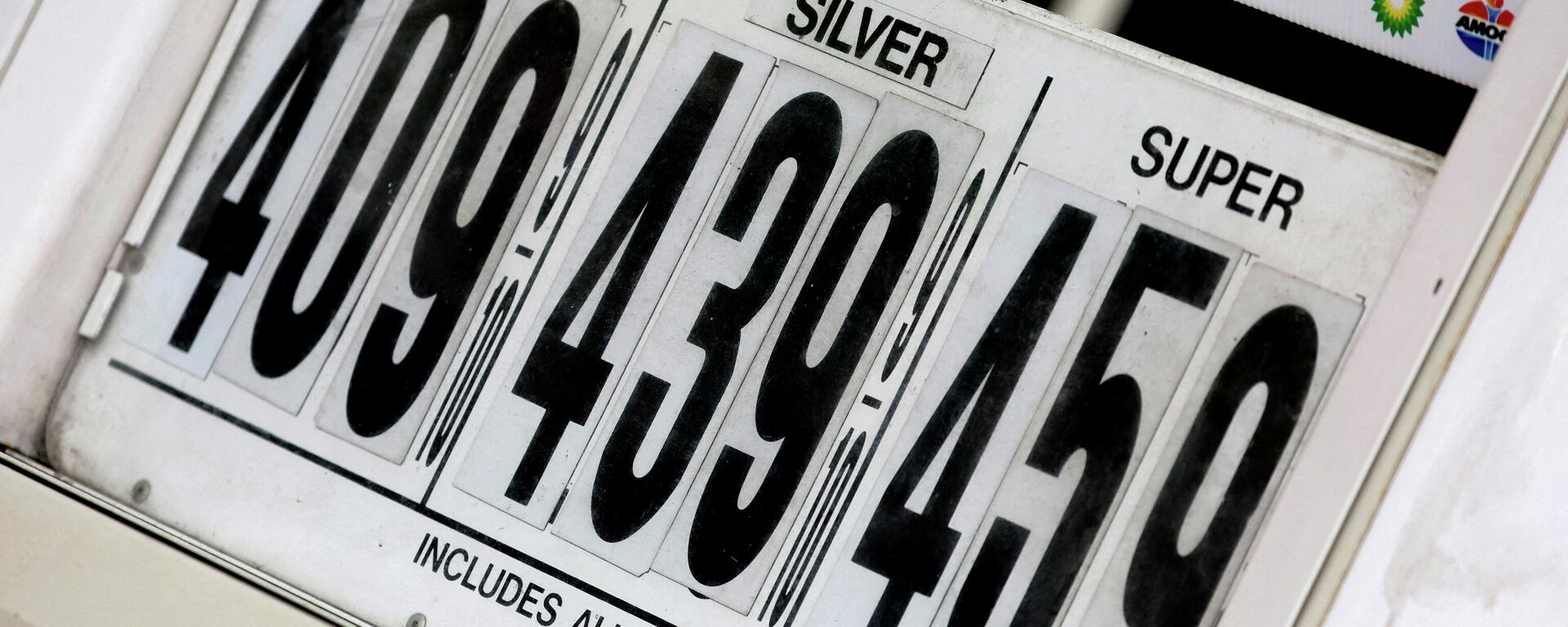https://sputnikglobe.com/20220317/will-american-consumers--businesses-benefit-from-federal-reserves-interest-rate-hikes-1093971676.html
Will American Consumers & Businesses Benefit From Federal Reserve's Interest Rate Hikes?
Will American Consumers & Businesses Benefit From Federal Reserve's Interest Rate Hikes?
Sputnik International
On 16 March, the US Federal Reserve approved the first 0.25 percent hike in more than three years and projected six more this year in order to tackle... 17.03.2022, Sputnik International
2022-03-17T19:04+0000
2022-03-17T19:04+0000
2022-08-06T13:36+0000
us
world
opinion
us economy
federal reserve
interest rate
covid-19
recession
inflation
https://cdn1.img.sputnikglobe.com/img/107001/33/1070013318_0:0:1921:1080_1920x0_80_0_0_fb51c6f98375d4dbd0c8f6daccf5005f.jpg
"The US inflation is not a monetary inflation", explains Dr Paul Craig Roberts, US economist and ex-assistant secretary of the treasury under Ronald Reagan. "It is caused by the COVID lockdowns that disrupted production and reduced supply. The rise in interest rates will raise business costs and hamper the recovery of supply".The Federal Reserve's decision to increase interest rates came in response to rising inflation. While in September 2021, inflation was barely seen as a top concern, in October 2021 consumer prices went up, with inflation hitting a 31-year high. The Consumer Price Index for All Urban Consumers leapt 6.2 percent for the year ending in October 2021, according to the US Bureau of Labour Statistics (BLS). Several months later, the BLS' 2022 March Consumer Index Summary revealed that the average price of consumer goods had increased by 7.9 percent over the previous 12 months.Even several hikes are unlikely to solve the inflation problem once and for all, deems Sergio Rossi, professor of macroeconomics and monetary economics at the University of Fribourg in Switzerland.The academic expects that US businesses will suffer, "since their sales figures will be lower, and will have to pay higher rates of interest on their banks' debt eventually". American exporters could also feel pain from this monetary policy decision, according to Rossi. He projects that they will see a sharp reduction of their exports, also because of the geopolitical tensions between the West and Russia.When it comes to American consumers, they might benefit from the interest rate hikes only when they buy foreign goods or services, as a result of appreciation of the US dollar on the foreign exchange market, notes the economist. At the same time, however, they are also likely to face higher interest rates on their mortgage loans which would nullify the aforementioned benefits, according to him.Gasoline & Oil Prices Will Continue to GrowMeanwhile, the situation with high gasoline prices in the US – which has been blamed by many for the inflation rally – is unlikely to improve in the wake of the Federal Reserve's hikes either, according to Dr Paul Craig Roberts.Moreover, Western countries' sanctions against Russia's energy sector might exacerbate the situation even further, according to Sergio Rossi.Russia is the world's third-largest oil producer behind the United States and Saudi Arabia, according to the International Energy Agency (IEA). The agency assesses that in January 2022, Russia's total crude production was 11.3 million barrels per day (mb/d), of which 10 mb/d was crude oil, 960 kb/d condensates and 340 kb/d natural gas liquids (NGLs)."For both the US and European countries the price of gasoline could further increase over the short run as a result of the geopolitical tensions and related sanctions", the academic forecasts.Even though oil prices plunged below $100 earlier this week, they are likely to increase further along with other raw materials "for all those purchasing them outside the US, since the exchange rate of their own national currency depreciates in terms of US dollars", according to Rossi."This could aggravate the situation for both firms and households outside the US, as their purchasing power is reduced and thereby their expenditures are lower", he says. "Over the long run, such an evolution of the global economy will impact negatively also on the US economy, particularly as regards the wage level of middle-class workers and thereby households' purchasing power".Could Hikes in Interest Rate Lead to Recession?"The US economy, in fact, is not solid enough to absorb such a monetary policy restriction over the short run", says Sergio Rossi. "There are at least two problems in this regard. Firstly, the further appreciation of the US dollar will reduce US exports, thereby affecting several American firms negatively. Secondly, once US banks increase their own interest rates, their debtors – both firms and households – will reduce their own expenditures, with a series of negative consequences across the US economy".The economist projects that both problems will also negatively affect the global economy over the long run. This negative effect would be amplified by this occurring "in a period where this economy has been much suffering from the pandemic crisis since early 2020 and more recently from the geopolitical crisis – both of which are still unresolved", according to Rossi.Prior to Wednesday's announcement of the 0.25 percent hike, the probability of a recession in the US was raised to 33 percent in the next 12 months, according to the latest CNBC Fed Survey. At the same time, the chance of a recession in Europe was projected at 50 percent.Meanwhile, the Federal Reserve has lowered its US economic growth forecast and now sees the nation's GDP at 2.8 percent this year, down from the 4 percent it had predicted in December 2021. The GDP forecast for 2023 slipped to 2.2 percent, according to the central bank's Summary of Economic Projections.Let's stay in touch no matter what. Follow our Telegram channel to get all the latest news: https://t.me/sputniknewsus
https://sputnikglobe.com/20220317/feds-faster-pace-of-interest-rate-hikes-raises-risks-for-states-relying-on-dollar---imf-1093966450.html
https://sputnikglobe.com/20220315/gas-prices-in-united-states-will-likely-continue-to-go-up--white-house-1093903377.html
Sputnik International
feedback@sputniknews.com
+74956456601
MIA „Rosiya Segodnya“
2022
News
en_EN
Sputnik International
feedback@sputniknews.com
+74956456601
MIA „Rosiya Segodnya“
Sputnik International
feedback@sputniknews.com
+74956456601
MIA „Rosiya Segodnya“
us, opinion, us economy, federal reserve, interest rate, covid-19, recession, inflation
us, opinion, us economy, federal reserve, interest rate, covid-19, recession, inflation
Will American Consumers & Businesses Benefit From Federal Reserve's Interest Rate Hikes?
19:04 GMT 17.03.2022 (Updated: 13:36 GMT 06.08.2022) On 16 March, the US Federal Reserve approved the first 0.25 percent hike in more than three years and projected six more this year in order to tackle skyrocketing inflation. The policymaking Federal Open Market Committee sees three more hikes in 2023. However, there is also a risk of tipping the economy into recession, according to experts.
"The US inflation is not a monetary inflation", explains Dr Paul Craig Roberts, US economist and ex-assistant secretary of the treasury under Ronald Reagan. "It is caused by the COVID lockdowns that disrupted production and reduced supply. The rise in interest rates will raise business costs and hamper the recovery of supply".
The Federal Reserve's decision to increase interest rates came
in response to rising inflation. While in September 2021, inflation was barely seen as a top concern, in October 2021 consumer prices went up, with inflation hitting a 31-year high. The Consumer Price Index for All Urban Consumers leapt 6.2 percent for the year ending in October 2021, according to the US Bureau of Labour Statistics (BLS). Several months later, the BLS' 2022 March Consumer Index Summary revealed that the average price of consumer goods had increased by 7.9 percent over the previous 12 months.
"The quarter-point hike on its own will do little to impact inflation", says Michael R. Englund, principal director and chief economist for Action Economics. "The SEP reveals expectations of the equivalent of a quarter-point hike at every meeting in 2022, however, with another four quarter-point hikes in 2023, and the yield curve has priced in this more aggressive policy path".
Even several hikes are unlikely to solve the inflation problem once and for all, deems Sergio Rossi, professor of macroeconomics and monetary economics at the University of Fribourg in Switzerland.
"In fact, increasing rates of interest policy cannot address inflationary pressures properly, since the latter do not result from banks' volume of credit lines granted to either consumers or firms in the United States", says the professor. "Indeed, if banks increase their own rates of interest when they open a credit line to a firm, the latter will reduce its investment in the US economy, inducing a negative effect on both GDP growth and employment".
The academic expects that US businesses will suffer, "since their sales figures will be lower, and will have to pay higher rates of interest on their banks' debt eventually". American exporters could also feel pain from this monetary policy decision, according to Rossi. He projects that they will see a sharp reduction of their exports, also because of the geopolitical tensions between the West and Russia.
When it comes to American consumers, they might benefit from the interest rate hikes only when they buy foreign goods or services, as a result of appreciation of the US dollar on the foreign exchange market, notes the economist. At the same time, however, they are also likely to face higher interest rates on their mortgage loans which would nullify the aforementioned benefits, according to him.
"The increase will raise the cost of carrying debt", stresses Dr Roberts. "It could cause some trades based on interest rate differentials to unwind and some derivatives to unwind".
Gasoline & Oil Prices Will Continue to Grow
Meanwhile, the situation with high gasoline prices in the US – which has been blamed by many for the inflation rally – is unlikely to improve in the wake of the Federal Reserve's hikes either, according to Dr Paul Craig Roberts.
"[Gas prices won't plummet] unless the rise in interest rates slows the economy and results in less demand for oil", says the former Reagan administration official. "As far as I can tell, there is no reduction in oil supply. The price rise is due to the expectation of economic recovery from COVID, to hysteria over Ukraine, and to oil companies using 'crisis' to raise prices".
Moreover, Western countries' sanctions against Russia's energy sector
might exacerbate the situation even further, according to Sergio Rossi.
Russia is the world's third-largest oil producer behind the United States and Saudi Arabia, according to the International Energy Agency (IEA). The agency assesses that in January 2022, Russia's total crude production was 11.3 million barrels per day (mb/d), of which 10 mb/d was crude oil, 960 kb/d condensates and 340 kb/d natural gas liquids (NGLs).
"For both the US and European countries the price of gasoline could further increase over the short run as a result of the geopolitical tensions and related sanctions", the academic forecasts.
Even though oil prices plunged below $100 earlier this week, they are likely to increase further along with other raw materials "for all those purchasing them outside the US, since the exchange rate of their own national currency depreciates in terms of US dollars", according to Rossi.
"This could aggravate the situation for both firms and households outside the US, as their purchasing power is reduced and thereby their expenditures are lower", he says. "Over the long run, such an evolution of the global economy will impact negatively also on the US economy, particularly as regards the wage level of middle-class workers and thereby households' purchasing power".
Could Hikes in Interest Rate Lead to Recession?
"The US economy, in fact, is not solid enough to absorb such a monetary policy restriction over the short run", says Sergio Rossi. "There are at least two problems in this regard. Firstly, the further appreciation of the US dollar will reduce US exports, thereby affecting several American firms negatively. Secondly, once US banks increase their own interest rates, their debtors – both firms and households – will reduce their own expenditures, with a series of negative consequences across the US economy".
The economist projects that both problems will also negatively affect the global economy over the long run. This negative effect would be amplified by this occurring "in a period where this economy has been much suffering from the pandemic crisis since early 2020 and more recently from the geopolitical crisis – both of which are still unresolved", according to Rossi.
"Generally, Fed tightening cycles tend to end in recessions, as rates tend to rise through the second half of expansions, and the Fed tends to discover that it has overdone rate hikes with a long and variable lag. We probably have a long way to go with rate hikes until the economy contracts, however", says Michael R. Englund.
Prior to Wednesday's announcement of the 0.25 percent hike, the probability of a recession in the US was raised to 33 percent in the next 12 months,
according to the latest CNBC Fed Survey. At the same time, the chance of a recession in Europe was projected at 50 percent.
Meanwhile, the Federal Reserve has lowered its US economic growth forecast and now sees the nation's GDP at 2.8 percent this year, down from the 4 percent it had predicted in December 2021. The GDP forecast for 2023 slipped to 2.2 percent,
according to the central bank's Summary of Economic Projections.
Let's stay in touch no matter what. Follow our Telegram channel to get all the latest news: https://t.me/sputniknewsus 






